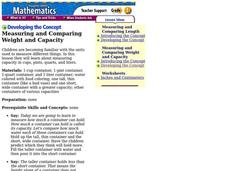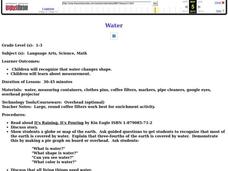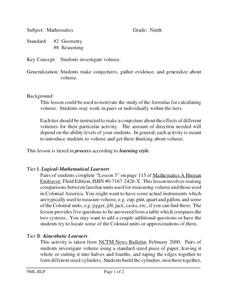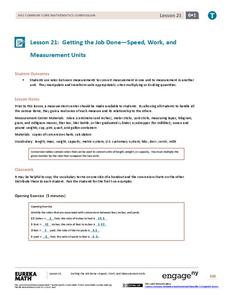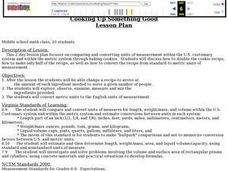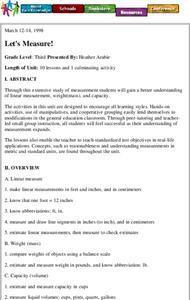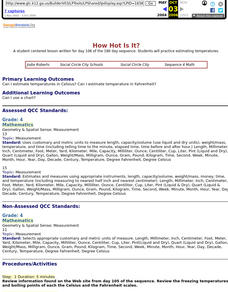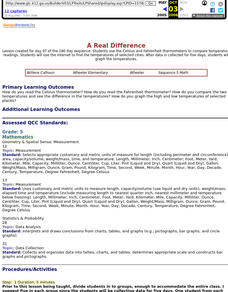Curated OER
Measuring and Comparing Weight and Capacity
First graders explore the concept of measurement. In this measurement lesson, 1st graders explore measurement techniques as they use containers to measure capacity. Students also practice solving problems that their instructors model.
Pennsylvania Department of Education
The Weight of Things
Students explore weight. In this math instructional activity, students predict which item weighs more and discuss how they arrived at their decision. Students weigh several items to determine which weighs more.
Curated OER
Water
Students complete activities to examine the properties of water. In this water science lesson, students read a book about water's forms and study a map or globe of the Earth to investigate water. Students discuss living things that need...
Curated OER
Measurement Benchmarks and Conversions
Students explore the concept of measurement. For this measurement lesson, students determine appropriate units of measure for objects in the classroom. Students discuss the importance of measuring objects with the same unit of measure.
Curated OER
Partial Products
Third graders study partial-products algorithms. In this math lesson, 3rd graders use an algorithm to find the product of factors. Students discuss the relationships between multiplication and division.
Curated OER
Working With Liquid Measurements
Young scholars determine how to compare and calculate liquid measures. In this liquid measurement instructional activity, students review the most common liquid measures such as ounces, teaspoons, cups, pints, quarts, and gallons.
Curated OER
Pumpkin Pie for All!
Young scholars take a basic recipe for pumpkin pie that serves 8 and determine how many pies are necessary to feed their class. They convert the recipe measurements to make as many pies as they need and then make (and eat) the pies.
Curated OER
Making Fudge: Measuring Weight
Fourth graders measure the ingredients for a fudge recipe. In this measurement lesson, 4th graders practice measuring out the ingredients for a recipe to make fudge. Later, students get to enjoy the fudge they made.
Curated OER
Investigating Volume
Ninth graders investigate and make conjectures about volume. In this geometry lesson, 9th graders analyze data and predict the outcome. They calculate volume using different tiers.
EngageNY
Getting the Job Done—Speed, Work, and Measurement Units
How do you convert from one measurement to another? Pupils use unit rates to convert measurements from one unit to another in the 21st segment in a 29-part series. They convert within the same system to solve length, capacity, weight,...
Curated OER
It's All in the Measurements
Study customary measurements with your sixth graders. They will investigate linear and capacity measurements to then measure and convert linear and capacity units. Finally they will work in small groups to conduct experiments. Resources...
Curated OER
Tick Around the Clock
Learners examine and discuss the differences between clocks they are shown. Using the internet, they research how people used to tell time before clocks. They review what the long and short hand on the clock represent and practice...
Curated OER
Capacity
Eighth graders explore the term capacity and understand the word's meaning. They participate in several lab stations set up around the room in which they will estimate how many scoops it will take to fill the container. They then will...
Curated OER
Cooking Up Something Good
Students compare and convert units of measurement within the United States customary system and within the metric system by baking cookies. Students discuss how to double the cookie recipe, how to make only half of the recipe, and how to...
Curated OER
Back To the Basics: Measurement
Lead the class in a review of the basic concepts and procedures involved in measuring length, weight, and volume. After whole group instruction, small groups and individuals practice measuring by completing a variety of fun activities...
Curated OER
Marvelous Mathematics
Students make a table on the computer, but create fractions and equivalent fractions through the use of color. They are able to manipulate fractions in order to gain a greater understanding of the meaning of whole number that is broken...
Curated OER
The Grouchy Ladybug
Students complete a Cirlce Map about time. They recall times during the grouchy ladybugs travels, and add dots on ladybugs using turn-around facts. Pupils correctly sequence the events of The Grouchy Ladybug. Students compose new...
Curated OER
Volume
In this volume worksheet, students participate in an experiment to test the volume in a few food containers. Students complete an experiment and then answer six comprehension questions regarding the results of their experiment.
Curated OER
Customary Units of Capacity
For this customary units worksheet, learners use the recipes that list customary units for capacity to solve the word problems. Students solve six word problems.
Curated OER
Let's Measure
Third graders practice measuring different objects. They discover the concepts of ratio and proportion and practice converting numbers into the correct unit. They read stories as well to help them with the concepts.
Curated OER
Convert Customary Units and Units of Time
In this converting measurements worksheet, students use the table to solve 6 story problems that require students to convert customary units and units of time.
Curated OER
How Hot Is It?
Fourth graders practice estimating temperatures. They practice in Celsius and Fahrenheit.
Curated OER
A Real Difference
Fifth graders use the Celsius and Fahrenheit thermometers to compare temperature readings. They use the Internet to find the temperatures of selected cities. After data is collected for five days, 5th graders graph the temperatures.
Curated OER
Drink It Up!
Young scholars investigate how the human body needs water by recording their water consumption for a day. They sing a song about drinking water, make and drink Kool-Aid and eat apple slices, and conduct an experiment to determine how...


